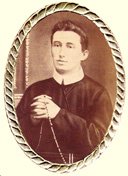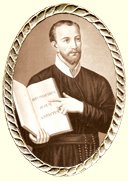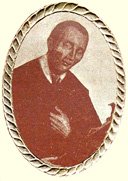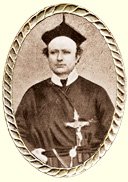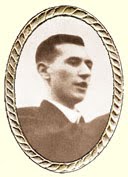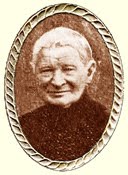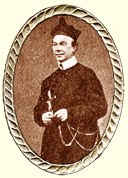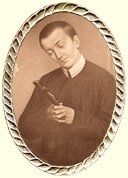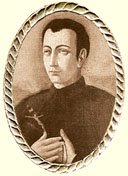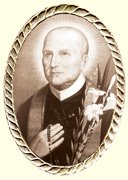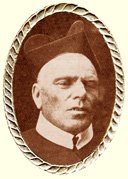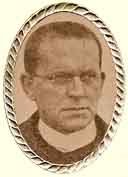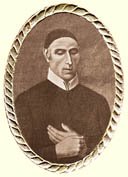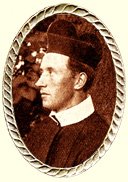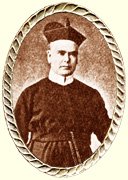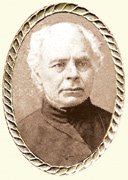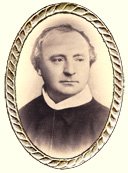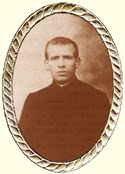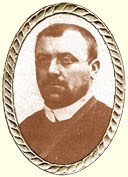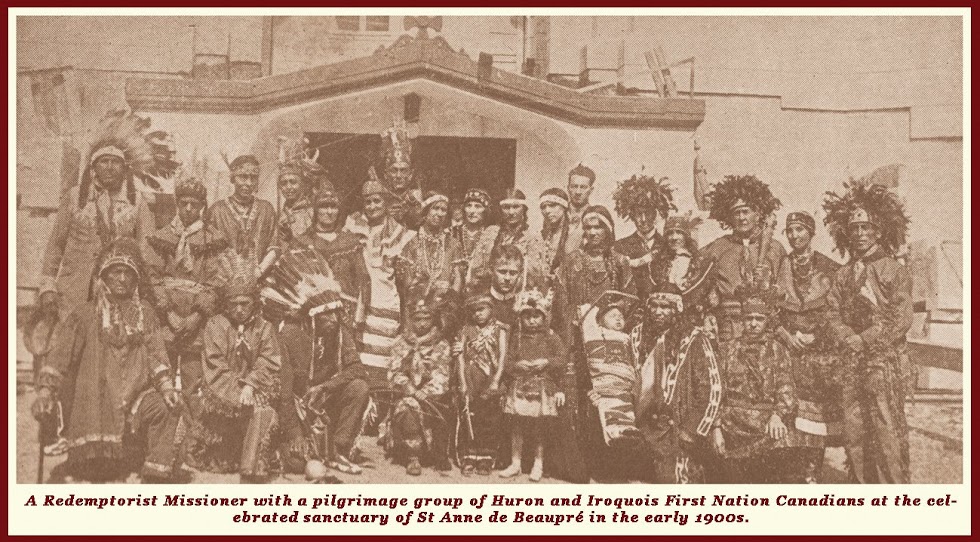Rev. Fr John Antwerpen, C.SS.R. (1822-1853)
Father Van Antwerpen was at the first Mission given in Ireland in 1851 and he was the first of the band of missionaries to go to his reward. He died at Bishop Eton on the 19th of October 1853, how full of merits, our short notice will reveal.
Born in Endhoven, in Holland, on the 29th of January, 1822. He had the great blessing of pious parents, and he grew up under their eyes like another St Gerard. Before he had reached the age of seven he used to shed tears when he heard that anyone had offended God. When hardly six years old, one day he was missed from home. His parents looked for him everywhere and at last, after long search, found him in the Church. He was kneeling in a quiet corner, praying to Jesus in the Tabernacle.
We do not know what passed between him and the Divine Prisoner, but we do know that from his tenderest years, he did penance for sin, and strove to lead other children to practice piety. After his First Communion his devotion to the Blessed Sacrament grew more and more. Even in these early years he is known to have passed hours in prayer in the church.
In due course he made the ordinary studies in a college of his native town. Here he advanced in learning, and still more in virtue. About this time he resolved to lead a life of perfect chastity, and no persuasion could ever induce him to change his mind. He had always wished to consecrate himself to God in religion, but he knew not where.
The Blessed Mother of God, to whom he had always been most devout, led him to the Congregation of the Most Holy Redeemer. He received the Habit on the Feast of the Immaculate Conception in 1840. He made his profession on the same feast in 1841, a favour he won by prayer, for his health having given way, there would have been no hope humanly speaking of him making his profession in the Congregation.
He spent seven years in the house of Studies, at Wittem, living a life of great fervour, both when well and when ill; and was ordained priest in 1848. That same year he was sent to England. From the Monastery in Bishop Eton he went in 1851 to Limerick for the Mission in St John’s. There he inherited the name of good Father John, and was known by this title in the other Missions in which he took part. These were sixteen in all. The fervour with which he prayed, his devotion at the altar, the ardour with which he spoke especially of the Blessed Sacrament, impressed all who knew or heard him.
We cannot dwell on the power that God had given him to touch the hearts of sinners. In Letterkenny, for example, so great and evident was the change which he effected in the Ribbon-man that his Lordship the Bishop said, while shedding tears, “I never expected to see with my own eyes so great a blessing of God. “ All in the town and neighbourhood were converted. His simplicity and innocence drew every soul to him. But his heart went out especially to the poor and afflicted. He never measured his strength, which we know was not great, but worked as if he were one of the most robust.
His last Mission was in Wexford. Before leaving that town, when some said to him, “We shall soon see you again at the Renewal,” he raised his eyes to heaven and said, “No no …. I hope then to be in a better place.” He was indeed, worn out, and his superiors sent him home to Bishop Eton to rest. He knew that it was to be for a long rest, and he occupied himself only about his last journey. As he grew weaker the doctor was called in. The physician assured everyone that there was no danger and that the Father would soon be quite well. When he had left Father John said to his confessor, “Father, do not be deceived, I am certain that the time of my dissolution is at hand.” How can you know that:” asked the confessor, “your illness is not dangerous.” He then related how he had prayed that he might die when he had attained the age of our Blessed Lord. “My time,” he said, “is come and I feel that I shall soon die from this illness.
Soon the slight illness turned into typhoid fever. It made such progress that the last Sacraments were administered to him on the Feast of the Purity of the Blessed Virgin, that feast on which two years before he was present at the opening of the first Mission in St John’s. He received the Holy Viaticum on the 19th of October. From henceforth he was so weak that he could only say, O charity! O blessed sweetness!” He frequently pronounced the names of Jesus, Mary, and Joseph.
After night prayers the Community surrounding his bed said the prayers for the agonising, to which they added the Litany of our Lady’s Sorrow’s. When they came to the words: “Lamb of God who takest away the sins of the world, spare him through our Blessed mother of Sorrows,” his most innocent and beautiful soul took, we confidently hope, its flight to heaven. Throughout life his presence brought a blessing wherever he went. †
Born in Endhoven, in Holland, on the 29th of January, 1822. He had the great blessing of pious parents, and he grew up under their eyes like another St Gerard. Before he had reached the age of seven he used to shed tears when he heard that anyone had offended God. When hardly six years old, one day he was missed from home. His parents looked for him everywhere and at last, after long search, found him in the Church. He was kneeling in a quiet corner, praying to Jesus in the Tabernacle.
We do not know what passed between him and the Divine Prisoner, but we do know that from his tenderest years, he did penance for sin, and strove to lead other children to practice piety. After his First Communion his devotion to the Blessed Sacrament grew more and more. Even in these early years he is known to have passed hours in prayer in the church.
In due course he made the ordinary studies in a college of his native town. Here he advanced in learning, and still more in virtue. About this time he resolved to lead a life of perfect chastity, and no persuasion could ever induce him to change his mind. He had always wished to consecrate himself to God in religion, but he knew not where.
The Blessed Mother of God, to whom he had always been most devout, led him to the Congregation of the Most Holy Redeemer. He received the Habit on the Feast of the Immaculate Conception in 1840. He made his profession on the same feast in 1841, a favour he won by prayer, for his health having given way, there would have been no hope humanly speaking of him making his profession in the Congregation.
He spent seven years in the house of Studies, at Wittem, living a life of great fervour, both when well and when ill; and was ordained priest in 1848. That same year he was sent to England. From the Monastery in Bishop Eton he went in 1851 to Limerick for the Mission in St John’s. There he inherited the name of good Father John, and was known by this title in the other Missions in which he took part. These were sixteen in all. The fervour with which he prayed, his devotion at the altar, the ardour with which he spoke especially of the Blessed Sacrament, impressed all who knew or heard him.
We cannot dwell on the power that God had given him to touch the hearts of sinners. In Letterkenny, for example, so great and evident was the change which he effected in the Ribbon-man that his Lordship the Bishop said, while shedding tears, “I never expected to see with my own eyes so great a blessing of God. “ All in the town and neighbourhood were converted. His simplicity and innocence drew every soul to him. But his heart went out especially to the poor and afflicted. He never measured his strength, which we know was not great, but worked as if he were one of the most robust.
His last Mission was in Wexford. Before leaving that town, when some said to him, “We shall soon see you again at the Renewal,” he raised his eyes to heaven and said, “No no …. I hope then to be in a better place.” He was indeed, worn out, and his superiors sent him home to Bishop Eton to rest. He knew that it was to be for a long rest, and he occupied himself only about his last journey. As he grew weaker the doctor was called in. The physician assured everyone that there was no danger and that the Father would soon be quite well. When he had left Father John said to his confessor, “Father, do not be deceived, I am certain that the time of my dissolution is at hand.” How can you know that:” asked the confessor, “your illness is not dangerous.” He then related how he had prayed that he might die when he had attained the age of our Blessed Lord. “My time,” he said, “is come and I feel that I shall soon die from this illness.
Soon the slight illness turned into typhoid fever. It made such progress that the last Sacraments were administered to him on the Feast of the Purity of the Blessed Virgin, that feast on which two years before he was present at the opening of the first Mission in St John’s. He received the Holy Viaticum on the 19th of October. From henceforth he was so weak that he could only say, O charity! O blessed sweetness!” He frequently pronounced the names of Jesus, Mary, and Joseph.
After night prayers the Community surrounding his bed said the prayers for the agonising, to which they added the Litany of our Lady’s Sorrow’s. When they came to the words: “Lamb of God who takest away the sins of the world, spare him through our Blessed mother of Sorrows,” his most innocent and beautiful soul took, we confidently hope, its flight to heaven. Throughout life his presence brought a blessing wherever he went. †




















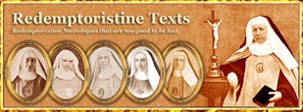
.jpg)









